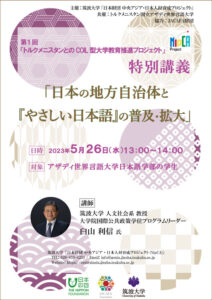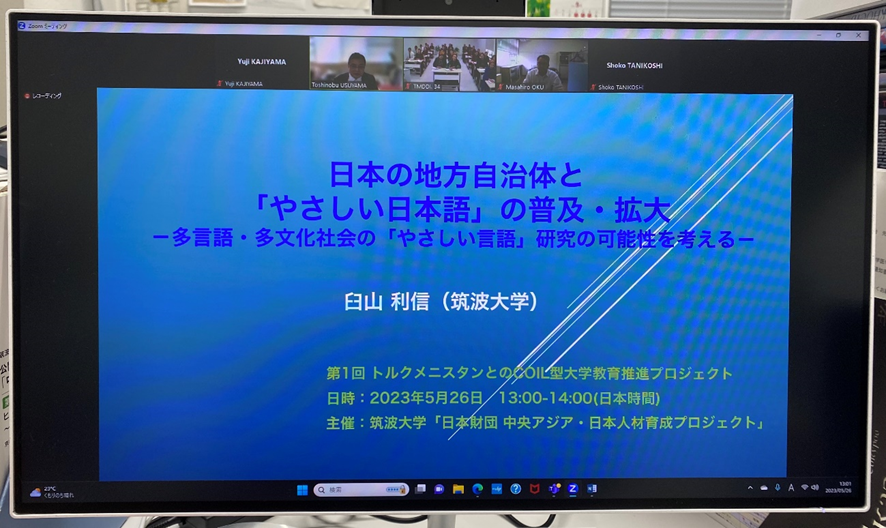On Friday, May 26, 2023, as part of the first “COIL-type Large-scale Education Promotion Project with Turkmenistan”, the NipCA Project Director, Professor Toshinobu Usuyama of the University of Tsukuba, delivered a lecture titled “Japanese Local Governments and the Spread and Expansion of ‘Easy Japanese'” to the students of the Japanese Language Department at Azadi University of World Languages. The lecture was conducted online via Zoom and attended by 24 Japanese-language students from Turkmenistan and 5 teachers.

This lecture began with a discussion about the increased focus on the number of foreign residents in Japan as the total population in the country, especially youth, continues to decline. With a simplified procedure to obtain the status of residence in Japan, the number of foreign residents is likely to continue to grow further. In fact, Japan’s strategy is toward becoming an immigrant-receiving country.
Therefore, in order to assess how comfortable the local environment is for foreign residents, this lecture presented an analysis of 44 municipalities in Ibaraki Prefecture (where the University of Tsukuba is located), specifically the current status and challenges of the multilingual support provided by local governments. Since there were many fatalities and injuries among foreign residents during the Great East Japan Earthquake that took place in March 2011, the Japanese government has paid particular attention to the promotion of “easy Japanese” to reduce the risks associated with natural disasters. The initial examination of the websites of local governments in Ibaraki Prefecture showed that many of them support more than one language, with Ryugasaki City supporting the largest number of languages (104). Professor Usuyama also presented the unique case of the city of Omitama, which has introduced “Cloud Translation,” a private online interpretation service. In the near future, this service—in which interpreters are contacted via tablet terminals to provide real-time interpretation online—will probably become more widely available.
However, elementary, junior high, high school, and other educational and medical institutions lag behind municipal websites in providing multilingual support, so various measures, such as integrating these websites into municipal websites, are a possible solution.
At the same time, bigger issues require more comprehensive solutions; thus, Professor Usuyama stressed the need for public awareness about the difficulties foreign residents face, especially in regards to access to information. Professor Usuyama also called for a wider discussion about the possibility of linking the principles and goals of the SDGs with the multilingual response activities provided by local governments to deepen public awareness about both, local and global issues.
In the second half of the lecture, Professor Usuyama also spoke on the importance and potential of “easy Japanese” research. This research was born out of a reflection on the failure to communicate disaster information to foreign victims of the Great Hanshin-Awaji Earthquake of January 1995. Actual examples of replacing Japanese with “easy Japanese” and examples of how local governments have adopted it were presented in the lecture, as was the introduction of a new and upcoming research field called “easy language” research.
This field holds tremendous potential for addressing SDG-related issues, such as disaster prevention and mitigation education and multicultural education.
At the end of the lecture, the audience asked questions about how Japanese people feel about the increasing number of foreigners in Japan, as well as how long foreigners can stay in Japan on a visa. The “COIL-type Large-Scale Education Promotion Project with Turkmenistan,” which provides classes at the University of Tsukuba, will continue, with a total of five lectures planned for this fiscal year.



